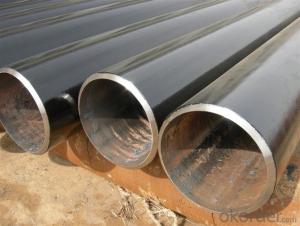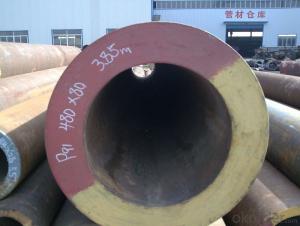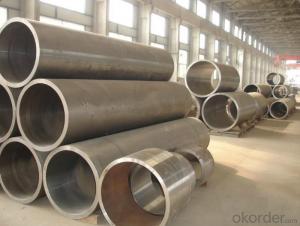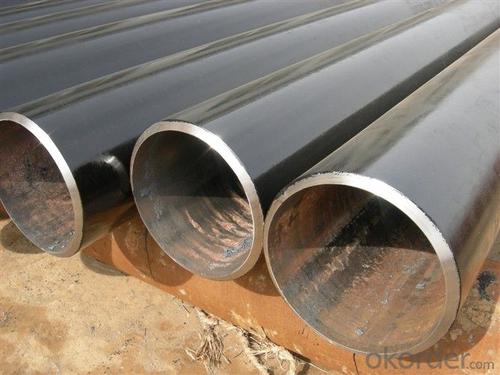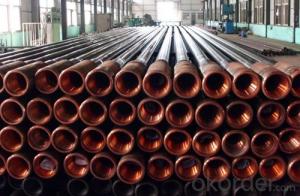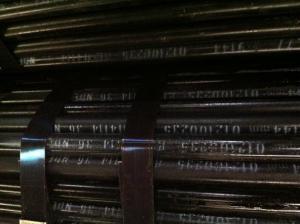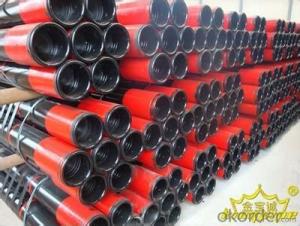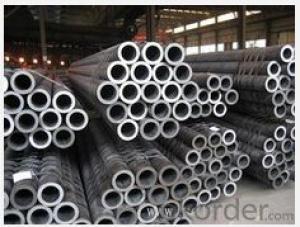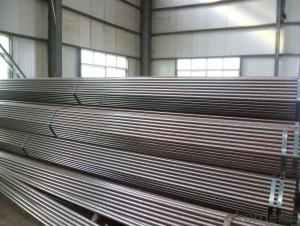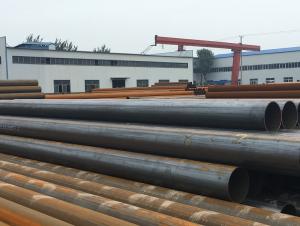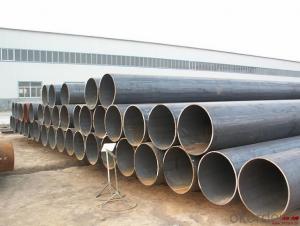Seamless Steel Pipe with High Quality and International Trader
- Loading Port:
- Tianjin
- Payment Terms:
- TT or LC
- Min Order Qty:
- 50 m.t.
- Supply Capability:
- 20000000 m.t./month
OKorder Service Pledge
OKorder Financial Service
You Might Also Like
PRODUCT DETAILS
1.Structure of Seamless Steel Pipe with High Quality and International Trader Description:
A large amount of Seamless Steel Pipes is offered to the clients at cost effective rates. These pipes are extremely durable, resistant to corrosion and have high tensile strength. Our pipes are used in nuclear plants, power plants, refineries and construction industry across the country. Furthermore, we are capable of providing these seamless pipes to the clients in bulk quantity.
2.Main Features of Seamless Steel Pipe with High Quality and International Trader:
• High manufacturing accuracy
• High strength
• Small inertia resistance
• Strong heat dissipation ability
• Good visual effect
•Reasonable price
3.Packaging & Delivery:
| Packaging Details: | Seaworthy packages, bundles wrapped with strong steel strip |
| Delivery Detail: | 15-30 days after received 30% TT |
4.Seamless Steel Pipe with High Quality and International Trader Specification:
| Standard: | GB, DIN, ASTM,ASME, ASTM A106-2006, ASTM A53-2007 |
| Grade: | 10#,20#, 45#, 16Mn |
Thickness: | 8 - 33 mm |
| Section Shape: | Round |
| Outer Diameter: | 133 - 219 mm |
| Place of Origin: | Shandong, China (Mainland) |
| Secondary Or Not: | Non-secondary |
| Application: | Hydraulic Pipe |
| Technique: | Cold Drawn |
| Certification: | API |
| Surface Treatment: | factory state or painted black |
| Special Pipe: | API Pipe |
| Alloy Or Not: | Non-alloy |
| Length: | 5-12M |
| Outer Diameter: | 21.3-610mm |
5.Product pictures
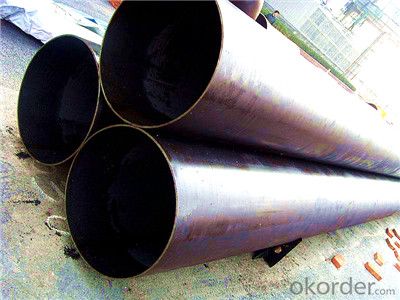
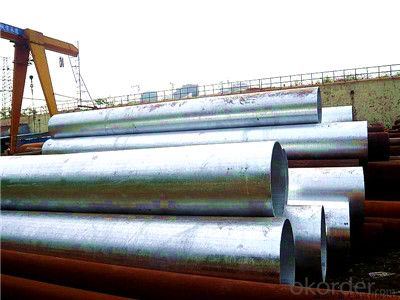
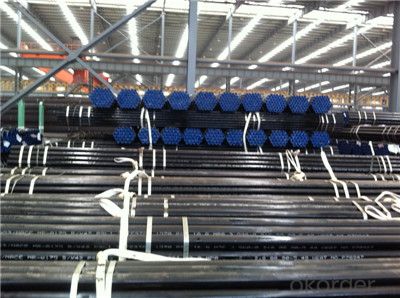
6.FAQ of Seamless Steel Pipe with High Quality and International Trader:
①How is the quality of your products?
Our products are manufactured strictly according to national and internaional standard, and we take a test
on every pipe before delivered out. If you want see our quality certifications and all kinds of testing report, please just ask us for it.
Guaranteed: If products’ quality don’t accord to discription as we give or the promise before you place order, we promise 100% refund.
②How about price?
Yes, we are factory and be able to give you lowest price below market one, and we have a policy that “ for saving time and absolutely honest business attitude, we quote as lowest as possible for any customer, and discount can be given according to quantity”,if you like bargain and factory price is not low enough as you think, just don’t waste your time.Please trust the quotation we would give you, it is professional one.
③Why should you chose us?
Chose happens because of quality, then price, We can give you both.Additionally, we can also offer professional products inquiry, products knowledge train(for agents), smooth goods delivery, exellent customer solution proposals.Our service formula: good quality+good price+good service=customer’s trust.
SGS test is available, customer inspection before shipping is welcome, third party inspection is no problem.
Any question, pls feel free to contact us !
- Q: Can steel pipes be used for swimming pool installations?
- Yes, steel pipes can be used for swimming pool installations. Steel pipes are commonly used for plumbing systems and can be appropriate for swimming pool installations due to their durability and resistance to corrosion. However, it is important to ensure that the steel pipes are properly coated or treated to prevent rusting and deterioration in a pool environment. Additionally, other factors such as water pressure and compatibility with other pool equipment should also be considered.
- Q: What is the minimum temperature that steel pipes can handle?
- The minimum temperature that steel pipes can handle depends on the specific grade and composition of the steel. Generally, steel pipes can handle extremely low temperatures without experiencing any significant issues. In fact, many types of steel are specifically designed to withstand extremely cold temperatures, making them suitable for various applications in industries such as oil and gas, construction, and cryogenics. However, it is important to note that at extremely low temperatures, steel may become more brittle, which can affect its mechanical properties. Therefore, it is essential to carefully select the appropriate grade of steel and consider any specific requirements or limitations for the intended application when determining the minimum temperature that steel pipes can handle.
- Q: What is the role of steel pipes in the food processing industry?
- Steel pipes play a crucial role in the food processing industry as they are used for various applications such as conveying fluids, gases, and other materials throughout the production process. These pipes are resistant to corrosion, have high strength, and can withstand extreme temperatures, making them ideal for transporting food products safely and hygienically. They are widely used for transporting water, steam, and other liquids, as well as for transferring ingredients, such as grains, oils, and sauces. Additionally, steel pipes are utilized in the construction of food processing equipment, such as mixers, blenders, and storage tanks, ensuring the durability and integrity of the entire production system.
- Q: How do you join two steel pipes together without welding?
- There are various ways to join two steel pipes together without welding. Mechanical fittings or connectors are commonly used for this purpose. These fittings are designed to securely connect pipes without the need for welding. Here are a few options you can explore: 1. Threaded Fittings: You can use threaded fittings, which have male and female threads that allow you to screw them together. To join the pipes, you will need to cut the ends of the pipes to create male and female threads. Apply thread sealant to ensure a tight and leak-free connection. 2. Compression Fittings: Another option is compression fittings, which consist of a nut, a compression ring, and a compression seat. These fittings create a tight seal by compressing the ring against the seat. Simply slide the compression ring and nut onto the pipe ends, and use a wrench to tighten the nut until a secure connection is formed. 3. Flange Connections: Flange connections involve using flanges, which are flat plates with bolt holes, to join the pipes. The flanges are bolted together using gaskets to create a tight seal. This method is commonly used for larger diameter pipes or in situations where frequent disassembly may be necessary. 4. Grooved Couplings: Grooved couplings are another option, particularly in plumbing and fire protection systems. They utilize a mechanical coupling housing with two grooved ends that fit over the pipe ends. The coupling is then secured using bolts or screws, which tighten the housing around the pipe ends, creating a secure connection. Before deciding on a method, it is crucial to consider the specific requirements of your application, such as the pipe diameter, pressure, and temperature. Additionally, ensure that the chosen method complies with relevant industry standards and regulations to ensure a safe and reliable connection.
- Q: How do steel pipes handle soil movement?
- Steel pipes are able to handle soil movement effectively due to their inherent strength and flexibility. The sturdy nature of steel allows the pipes to withstand the pressures exerted by soil movement, while their flexibility enables them to adapt and adjust to changes in the soil's position without fracturing or breaking. Additionally, steel pipes can be designed with specific coatings and reinforcements to further enhance their resistance to soil movement, making them a reliable choice for various applications.
- Q: What is the importance of corrosion resistance in steel pipes?
- Corrosion resistance in steel pipes is crucial as it helps prevent the deterioration of the pipes due to chemical reactions with substances in their surroundings. This resistance ensures the longevity and durability of the pipes, minimizing the risk of leaks, clogs, and structural failures. Additionally, it helps maintain the quality and safety of the transported fluids or gases, preventing contamination or degradation. Overall, corrosion resistance in steel pipes is essential for maintaining efficient and reliable infrastructure systems in various industries such as oil and gas, water supply, and construction.
- Q: What is the outer diameter and wall thickness of DN40 steel pipe?
- DN40, refers to the diameter of 40mm, that is, an inch and a half, there are welded pipe and galvanized pipe,Ordinary wall thickness 3.5mm wt 3.84kg/mThicken 4.25mm weight 4.58kg/m
- Q: What are the different sizes available for steel pipes?
- Steel pipes are available in a wide range of sizes, ranging from small diameters as small as 1/8 inch to larger diameters exceeding 72 inches. The sizes of steel pipes are typically measured based on their outside diameter (OD) and wall thickness, with various standard sizes available to meet different application requirements.
- Q: What are the different pressure ratings for steel pipes?
- The different pressure ratings for steel pipes can vary depending on factors such as pipe size, wall thickness, and the type of steel used. Common pressure ratings for steel pipes range from 150 psi (pounds per square inch) to 2500 psi or higher.
- Q: What is the difference between steel pipe and aluminum pipe?
- The main difference between steel pipe and aluminum pipe lies in their composition and properties. Steel pipe is made primarily of iron and carbon, with other elements added to enhance its strength and durability. It is known for its high tensile strength, resistance to corrosion, and ability to withstand high temperatures and pressure. On the other hand, aluminum pipe is made from aluminum, which is a lightweight metal known for its excellent corrosion resistance, thermal conductivity, and malleability. While steel pipe is generally stronger and more rigid, aluminum pipe is lighter and more easily manipulated. Additionally, steel pipe is often used in applications where strength and durability are critical, such as in construction and plumbing, while aluminum pipe is commonly used in industries that require lightweight materials, such as aerospace and automotive.
Send your message to us
Seamless Steel Pipe with High Quality and International Trader
- Loading Port:
- Tianjin
- Payment Terms:
- TT or LC
- Min Order Qty:
- 50 m.t.
- Supply Capability:
- 20000000 m.t./month
OKorder Service Pledge
OKorder Financial Service
Similar products
Hot products
Hot Searches
Related keywords
